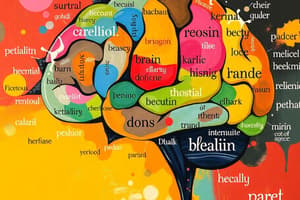Podcast
Questions and Answers
Какие элементы могут использоваться для передачи эмоций?
Какие элементы могут использоваться для передачи эмоций?
- Длина волос, тип обуви, цвет глаз
- Стиль одежды, бренд сумки, форма лица
- Высота человека, цвет волос, наличие усыновленных питомцев
- Мимика, тон голоса, язык тела (correct)
Какое слово можно использовать для описания сильного чувства потери?
Какое слово можно использовать для описания сильного чувства потери?
- Крашенный
- Счастливый
- Веселый
- Разочарованный (correct)
Какие слова относятся к положительной эмоциональной лексике?
Какие слова относятся к положительной эмоциональной лексике?
- Ленивый, раздраженный, злой
- Счастливый, радостный, благодарный (correct)
- Печальный, обеспокоенный, утомленный
- Гневливый, угнетенный, унылый
Что помогает лучше понять свои и чужие чувства?
Что помогает лучше понять свои и чужие чувства?
Какое слово можно использовать для описания крайнего чувства радости?
Какое слово можно использовать для описания крайнего чувства радости?
Какие слова помогают людям стать эмоционально интеллектуальными?
Какие слова помогают людям стать эмоционально интеллектуальными?
Какие выражения являются типичными для эмпатического общения?
Какие выражения являются типичными для эмпатического общения?
Что помогает нам реагировать на вызовы с более оптимистичным взглядом?
Что помогает нам реагировать на вызовы с более оптимистичным взглядом?
Какие понятия помогают развивать навыки самосознания и саморегуляции?
Какие понятия помогают развивать навыки самосознания и саморегуляции?
Соедините части предложений
Соедините части предложений
Flashcards are hidden until you start studying
Study Notes
Emotional vocabulary is crucial in understanding, recognizing, and expressing various feelings effectively. It helps individuals communicate their thoughts and emotions more accurately, fosters stronger relationships, and enhances overall wellbeing. In this article, we will discuss expressing emotions, positive and negative emotion vocabulary, emotional intelligence vocabulary, and empathy language.
Expressing Emotions
Expressing emotions involves verbal and non-verbal communication. While some emotions can be easily communicated through facial expressions, tone of voice, body language, eye contact, and touch, others may require specific vocabulary. For example, if someone is feeling overwhelmed with sadness, they might say, "I feel crushed under the weight of my emotions." Or, they could use phrases like "heartbroken," "devastated," or "desolate" to describe their intense sense of loss. Developing a strong emotional vocabulary allows us to better understand our own feelings and those of others.
Positive Emotion Vocabulary
Positive emotion vocabulary includes terms such as joyful, happy, grateful, elated, thrilled, and delighted. Using these words can help foster emotional resilience and create a more positive mindset. According to the author of "The Emotionally Resilient Manager," Kevin McCarthy, "how you see yourself and your situation determines how you react". By using positive emotion vocabulary, we can reframe our perspectives and respond to challenges with a more optimistic outlook.
Negative Emotion Vocabulary
Negative emotion vocabulary encompasses words like anger, sadness, frustration, disappointment, despair, and hopelessness. These terms can help us recognize negative emotions within ourselves and others. By acknowledging the existence of these feelings, we can learn to manage them more effectively. For example, instead of suppressing anger, individuals might use phrases like "I feel frustrated" or "I'm angry about this situation." This open expression allows for better emotional communication and understanding.
Emotional Intelligence Vocabulary
Emotional intelligence vocabulary is essential in developing self-awareness, self-regulation, social awareness, and relationship management skills. Some key terms include self-assessment, empathy, self-control, motivation, and conflict resolution. Understanding and using these words helps individuals become emotionally intelligent, enabling them to navigate complex social interactions with greater ease.
Empathy Language
Empathy language is crucial for demonstrating emotional competence and enhancing relationships. It involves expressing sensitivity to others' emotions while also being able to respond appropriately. Common expressions include acknowledging emotions ("You seem upset"), validating feelings ("It makes sense that you would feel frustrated after what happened"), and offering support ("That sounds really tough"). Using empathy language fosters deeper connections and helps individuals build more effective relationships.
In conclusion, emotional vocabulary plays a vital role in our ability to understand, communicate, and manage our emotions. Developing a strong emotional vocabulary not only improves personal wellbeing but also enhances our interpersonal relationships and overall effectiveness in navigating life's challenges.
Studying That Suits You
Use AI to generate personalized quizzes and flashcards to suit your learning preferences.




